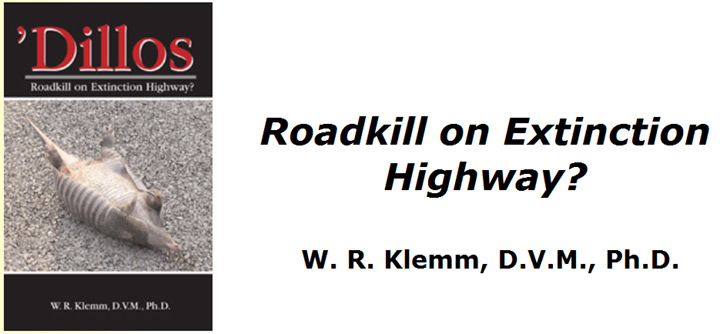-
info@aaanimalcontrol.com
Call us for help in your town
Humane Wildlife Education
Book: 'Dillos: Roadkill on Extinction Highway?

04.11.2012 - Author, speaker, professor, and jazz aficionado William Klemm has written this delightful book about one of nature's greatest
survivors, the armadillo.
Despite a brain the size of a walnut (the armadillo, not Dr. Klemm!), this strange little critter has managed to survive for 55 million years, outcompeting many other animals along the way. This
book examines the history of the armadillo, and discusses many of its unique traits. Author Klemm has inserted many of his witty and insightful observations on this special
animal. The book is available on Amazon.com. To read more, or to purchase the book, visit his website at:
http://thankyoubrain.com/armadillos/
Do it yourself: Visit my How To Get Rid of Armadillos page for tips and advice.
Get professional help: Visit my Nationwide Pro Directory of wildlife removal experts.
For more wildlife stories, click my Wildlife Blog
or click my below banner to hire a local trapper.
It is unlikely that you cruise for hours around the Texas roads and not see an armadillo or two, the state animal of Texas. Their English name is derived from the Spanish word meaning “little armored one.” Resembling scaly, prehistoric rocks, armadillos are actually mammals that are native to both North and South America, and the only mammals that have a protective armor.
Difficult to trap, they spit like baseball players and have the insane habit of jumping straight into traffic. During the Great Depression, their depletion may be due to Texans dining on armadillo meat, called the ‘the poor man's pork', or the ‘Hoover hog', but since the development of motor vehicles, their cause of death is mostly road accidents. Many of these nocturnal, burrowing mammals, like other wildlife, often die when cars, trucks and other vehicles hit them.
Hence, a dead armadillo in the middle of the road is not an uncommon sight locally. W. R. Klemm's book Dillos: Roadkill on Extinction Highway? discusses the plight of these scaly mammals, which are actually small enough to pass safely under a car, but jump straight into the undercarriage when they are frightened, as stated by the National Wildlife Federation. The reason why they are such a road hazard is that their shells are hard enough to cause a bullet to ricochet, and can cause drastic physical damage to a vehicle and puncture its tires. Instead of being slow, as they are fallaciously thought to be, they can run fast, up to 30 miles per hour. A common response of theirs to predators is to jump, which makes them especially vulnerable when they wander onto a road. Armadillos can jump about three or four feet straight up into the air, which puts them above the hood of many cars, leading to disasters.
Lately, there seem to be more dead armadillos around because of their breeding season, which starts in July. Rainfall near the end of August provides them with more feeding opportunities because the ground is softer, allowing them to dig up beetles, other bugs and earthworms; this increases their roaming activity and causes them to chance upon roads and become roadkill victims in the process. Even when it's dry, roads can be good feeding grounds for armadillos, since insects get hit by cars and if an armadillo finds them, it is going to stop and eat them. Hence they chose to amble along when crossing the road.
The most prudent thing to do is to avoid armadillos when possible, be vigilant while driving, and on spotting an animal in the distance, decelerate or turn your steering away.




















